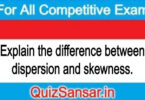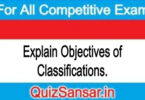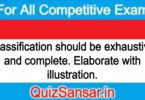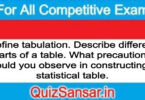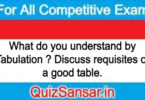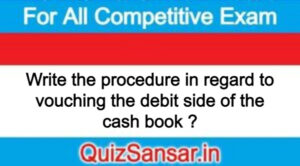
Write the procedure in regard to vouching the debit side of the cash book ?
Write the procedure in regard to vouching the debit side of the cash book ?
Ans.
PROCEDURE IN REGARD TO VOUCHING THE DEBIT SIDE OF THE CASH BOOK
After satisfying himself that there is a good internal check system regarding the receipts and payments of cash, the audit clerk should now proceed to vouch the debit side of the cash book. It is rather very difficult to vouch the receipt of cash as some entries might have been omitted altogether and therefore only an indirect evidence is available. He should check a few items at random and if he finds that they are in order, he may assume that the others will be correct but he must not omit to compare the rough cash book or the diary with the cash book. If he fails to do so and later on a fraud is detected he might be held responsible: If he finds that there is a time-lag between the two dates, he should go deeper into the matter as it is possible that money might have been received in between the two dates and misappropriated.
Sometimes it is argued that the auditor is not responsible if he does not check rough cash book diary because such books are not included in the ‘book of account’. The argument may appear to be sound to some extent, but if such books are the part of the system of account books maintained by the company, the auditor will be failing in his duty, if he does not compare the rough cash book or diary with the cash book. The duty of an auditor is not only to examine the books of accounts but also to go beyond them which means that he should examine the memoranda books, and other evidence available in support of the correctness of the books of account. Some of the important items which usually appear on the debit side of the cash book and the duty of an auditor in that connection are given below:
1. Opening Balance
This should be compared with the balance shown in the duly audited balance sheet of the previous year. This is done to see that the actual balance has been brought down.
2. Cash Sales
There are greater chances of fraud under this head. The salesman may sell goods and may not make an entry in the cash book and thus misappropriate the money. The following system should be adopted to avoid fraud. The salesman should neither deliver the goods to customers nor receive cash for the goods sold. He should prepare three carbon copies of the cash memo when goods are sold to a customer, to whom two copies of the cash memo are handed over. The goods are in the meantime sent to the cashier. The customer goes to the cashier and hands over the cash memos. The cashier who receives the price of the goods, hands over the goods and a copy of the cash memo duly stamped as ‘cash paid’, while the other copy of the cash memo is retained by him sometimes four copies of the cash memo are prepared. The fourth copy is retained by the gatekeeper who hands over the goods to the customers instead of by the cashier. At the end of the day, the salesman, the cashier, and the gate-keeper prepare the summaries and send them to the General Manager. The summary sent by the salesman shows the quantity and value of the goods sold; one sent by the cashier will show the cash collections against the cash memos and one sent by the gate-keeper will show the goods delivered. All the three summaries must tally. If there is any discrepancy, it will mean that some fraud has been committed by some one. The auditor should check here and there a few items from the salesman’s summaries, cashier’s summaries and the gate-keeper’s extracts. If the auditor does not do so, he will be held liable for any fraud which remained undetected as was decided in the case of Pendlebury’s Ltd. Vs. Ellis, Green & Co. in 1936.
Where automatic tills are in use, the entries in the cash sales book and in the cash book should be verified from the till records.
In some business houses cash memos are issued against goods sold on credit. The reason advanced is that this system ensures prompt payment. In such a case, there maybe so many cash memos against which there may be on cash. Therefore, it would be rather impossible to vouch cash. The auditor should disown his responsibility in such a case. Such a system should however, be discouraged.
The auditor should compare the dates on the cash memos and the cash book. If cash discount has been allowed on sales, he should see that a uniform policy and rate of discount has been followed. The cancelled cash memo should not be detached from the book. He may also compare a few items of sale with the stock.
3. Receipts from Debtors
The auditor should vouch cash received from debtors to whom good have been sold on credit in the past. The only evidence available on account of this item is the counterfoils of the receipts issued to the debtors. But this evidence is not very reliable as less amount might have been issued inserted in the counterfoils than what had actually been received from the customers to whom a receipts for the full amount might have been and less amount recorded on the debit side of cash book.
4. Income from Interest, Dividends, etc.
Interest received on account of fixed deposits in the bank should be vouched with the bank pass book. Sometimes a fictitious pass book is produced. Care must be taken to see that it is a genuine one.
Dividends received can be vouched with the counterfoil of “tops” of the dividend warrants or the letter covering the cheques. Interest received on securities can be vouched from the securities themselves or from the tax deduction certificate issued by the Reserve Bank, or from the Investment Ledger as to the date of the receipt of interest, the amount, the rate, etc. Care should be taken to adjust the outstanding interest. The auditor should check the receipt of such an interest in the beginning of the subsequent year. Interest received for any particular fund like Provident Fund, should be credited to that fund and not to the revenue account.
If the interest has been received on account of the loan granted, agreement with the borrower should be inspected to assertion the rate of interest, the date for the payment of interest etc.
If dividend warrants or securities, etc., are deposited with the bank. for the purpose of collection of interest and dividends, bank pass book must be referred to. If the investments have been sold ‘ex-dividend or bought ‘cum-dividend the auditor should examine broker’s Sold and Bought Notes respectively and should see that dividend is received subsequently. He should also see in such a case that proper allocation is made between capital and revenue.
5. Loans
The receipt of loan should be vouched with the agreement with the lender. He should see whether his client is entitled to raise loan. He should examine the rate of interest payable, the terms of repayment and the security offered which should be examined. The security offered should be indicated in the balance sheet. The interest due but not paid at the balance sheet date should be adjusted in the accounts.
6. Rents Received
The auditor should examine the Lease Deeds and agreements to ascertain the amount of rent payable, the due date, and provision regarding the repairs, etc. Rent received may also by compared with the ‘rent rolls’ if they are maintained or list of various properties as in the case of owners of large estates. If receipts are issued to the tenants for the rent paid, the counter foils of the receipts would be a good evidence. If rents are collected by agents, their accounts must be examined.
Particular attention should be paid towards ‘rent-outstanding”. It is possible that rent might have been received but misappropriated while it may be shown as ‘outstanding’. In such a case, if the ‘outstanding’ is a heavy one, with the permission of the client, the auditor should write to the tenants requesting them to confirm the amount of the arrear of rent outstanding against their names. Provision should be made for the doubtful outstanding rents. Similar consideration must be paid towards properties shown as “unlet”. The auditor should get a list of such ‘unlet’ property duly signed by a responsible official.
7. Bills Receivable
Bills Receivable Book should be compared with Cash Book and the Pass Book to see that the amount has been received on the due date. Inquiries should be made regarding the bills which have matured but the amount has not been received for them. Such bills might have been dishonoured or retired. It is also possible that such bills might have been paid and the proceeds might have been misappropriated by the cashier. To discover this type of fraud, the auditor should examine the bills. If they had been paid, they would not be available. Contingent liability should be shown on the balance sheet in respect of bills receivable discounted but which have not matured at the date of the balance sheet.
8. Commission
Commission account should be checked with the accounts of the parties from whom commission has been received. Agreement with the parties regarding the rate of commission should be inspected. Counterfoils of the receipts should be checked with the amount in the cash book. To see the accuracy of the amount, calculations should be made.
9. Sale of Investments
The amount received on account of the sale of investment should be vouched with the Broker’s Sold Note. If they have been sold through the bank, examine the bank advice. If they have been sold ‘cum-dividend’ he should see that dividend is subsequently received and that the sale proceeds is properly apportioned between capital and revenue. If investments have been sold ‘ex-dividend’, the auditor should see that the dividend has been received subsequently. If any investment has been sold, in respect of any earmarked fund, any profit made or loss suffered should be credited or debited to that particular fund.
10. Bad Debt Dividends
The amount received from debtors, who have become bankrupt, should be vouched with the dividend warrants received from the Official Receiver or assignee indicating the total debt and the rate per rupee payable as dividend or any correspondence which might have passed between the debtor or the Official Receiver and the client in regard to the amount paid, the number of instalment and the balance due.
11. Subscriptions
Subscriptions received by a club or school, etc., should be checked with the Register of Subscribers and the counterfoils of the receipts.
12. Insurance Claim Money
Insurance money received against a claim from an insurance company should be checked with correspondence passing between the client and insurance company, the account rendered by the insurance broker or company.
13. Share Capital
For this item reference may be made to the Chapter on ‘Audit of Limited Companies’, where this item has been dealt with in greater detail. In the case of firms the Partnership Deed should be examined to find out the amount of capital contributed by each partner.
14. Sales of Fixed Assets
This item may be vouched with correspondence, auctioneer’s account, sale contract, minute book of the Board of Directors or any other evidence available. He should see that proper asset account has been credited with the amount. If there is any profit, that should be credited to the Capital Reserve Account which is not available for distribution to the shareholders. If any expenses have been pre-paid in respect of that asset, e.g., pre-paid insurance and the benefit of such an expense will be derived by the purchaser, a part of the proceeds should be credited to the Insurance Account.
The auditor should also see that the sale of such a property has been properly sanctioned.
15. Income from Hire-purchase Agreement
Where money is received on account of the instalment relating to goods sold on hire-purchase system, the auditor should examine the agreement. It should be remembered that the instalment includes interest also. The auditor should see that the whole of the amount is not credited to sales account. Proper allocation between sales and interest should be made.
16. Miscellaneous Receipts
Correspondence, contracts or any other document will help auditor to vouch such transactions.
- What is meant by Database Management System?
- Discuss the advantages and drawbacks of database.
- What do you mean by database ? Discuss its Characteristics.
- What is Data Mining?
- What are the conditions of communication?
- What do you mean by business communication ?
- organization / Differentiate between classical and modern theory of organization
- What is forecasting

